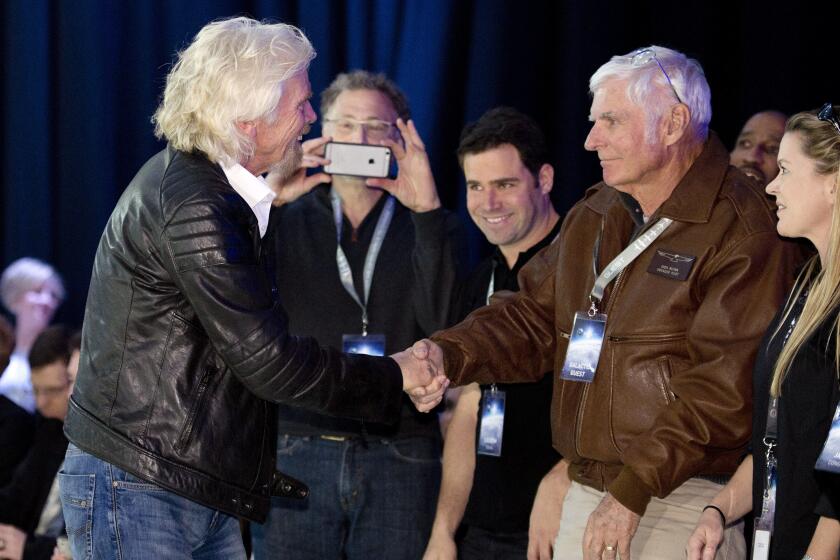‘Boss as Star’ Campaigns Can Backfire if the Executive Falls From Grace
In just a few weeks, TV commercials for Remington shavers will once again fill the airwaves. As always, these pre-Christmas spots will feature the firm’s perky leader, Victor Kiam II, best known for his laughable line about liking the shaver so much that he bought the company.
That sappy slogan was supposed to cause consumers to like Kiam so much that they would rush out to buy the shavers. And for years it worked. Remington became a real heavyweight as consumers snapped up the cordless whisker removers.
But several weeks ago, Kiam, who also owns the New England Patriots football team, stuck his football in his mouth. After a female newspaper reporter complained of sexual harassment in the Patriot locker room by several players, Kiam initially stuck up for his players. Only after several women’s groups threatened a boycott of his company did he relent and run apologetic ads.
Now, marketing experts say, Kiam’s credibility as a product pitchman may have turned from shining gold to razor-stubble black. The overnight tarnishing of his commercial credibility is not unlike that of hotel queen and convicted tax evader Leona Helmsley, whose familiar face has recently disappeared from her hotel chain’s advertising.
Indeed, when company leaders become spokesmen they can unintentionally become liabilities. Back in 1988, the Wickes furniture chain suddenly found itself without a TV spokesman when former Chairman Sanford C. Sigoloff (“We got the message, Mr. Sigoloff!”) left the company. Meanwhile, William S. Davila steps down as president of Vons Grocery Co. in 1992, and the company is still trying to figure out how it will replace his friendly and familiar mug in TV spots. And at 83, the frail Orville Redenbacher cannot forever hawk the popcorn that bears his name.
In the midst of all this, ad agency executives are asking aloud: Why risk placing top executives in ads?
“The minute these guys go on TV, it starts to corrupt them,” said Larry Postaer, executive vice president and creative director of the Los Angeles agency Rubin Postaer & Associates. “Because of all the money some executives put into their faces being on TV, they become celebrities larger than their products,” said Postaer. “It’s a perk that’s tougher to walk away from than a corporate jet.”
Some industry critics say chief executives are probably the very last people who should appear in ads. “I don’t understand the perception that viewers will believe something if a CEO says it,” said Dave Vadehra, president of the New York research firm Video Storyboard Tests. “There’s no reason to believe a chief executive. He has so much at stake that he’s the one who is most likely to lie. People are much more likely to believe a salesman.”
Perhaps the most familiar executive hawker is Chrysler Corp. Chairman Lee A. Iacocca, who has appeared in 68 ads since 1979. A brand new ad featuring Iacocca hyping Chrysler’s revamped minivans premiered over the weekend. “We try to keep him for just the major events,” said Arthur C. Liebler, vice president of communications at Chrysler. “We don’t want him there as just a huckster.”
Many have tried to follow in Iacocca’s footsteps. There’s R. David Thomas, the founder of Wendy’s, now seen on TV hawking chicken sandwiches in his bathrobe. Likewise, founder Carl N. Karcher has tried to get consumers to nibble on Carl’s Jr. fast food for years. And even Barron Hilton briefly tried to fill a few Hilton Hotel rooms by yakking in some TV spots.
But the going gets tough when an executive falls from grace. Both Kiam and Helmsley declined interviews through the same New York spokesman, Howard Rubenstein. The new Kiam ads are being tested during screenings to groups of consumers, Rubenstein said. “Oddly enough,” Rubenstein said of Kiam’s remarks about the female sportswriter, “if anything, the situation has only heightened the public’s awareness of the product and of Mr. Kiam.”
Marketing experts say it is usually ego that leads to executives pitching products.
Even after the Helmsley Hotel’s former advertising agency recommended against featuring Leona Helmsley in corporate ads, she continued to appear in them for months.
“The corporate policy was (that) her picture should remain in the advertising,” said Lawrence Aarons, chairman of the New York agency, Taylor-Gordon, Aarons & Co.
“Most agencies only place CEOs in ads because the CEOs want to be in them,” said Lee Kovel, chairman of the Japanese agency HDM Los Angeles. “But it’s fraught with peril. It’s dangerous for any one person to stand for a company, no matter who they are,” said Kovel, who, at a previous agency, helped create Eastern Airline ads that featured the airline’s short-time leader, Frank Borman.
Since that time, troubled Eastern recently turned to its court-appointed trustee, Martin R. Shugrue, to star in its ads. But even though Shugrue is generally regarded as a convincing spokesman, after just six months Eastern now says it will soon stop using him in ads.
“We don’t want him to be the star of the commercials,” said George Brennan, senior vice president of marketing at Eastern Airlines. “We want our advertising to focus on the product.”
Gemstar Fires Agency After Only One Month
These days it’s big news when an agency picks up a new account worth $3 million. But it’s also rather embarrassing when the agency loses the business within a month of announcing the win.
Last month, Gemstar VCR Plus, a Los Angeles maker of remote devices that program VCRs, awarded its account to the Los Angeles office of J. Walter Thompson. Last week, Gemstar turned around and handed the ad business to the Los Angeles office of DDB Needham Worldwide.
For DDB, the win is the second in three weeks. Last month, it won the ad business for the Moto du Monde motorcycle road-racing series. DDB/Los Angeles has picked up $40 million in new billings since Jan. 1, said Dave Park, president of the office, which now posts annual billings of $176 million.
Davis Ball Picks Up Avis’ Regional Account
The same agency that handles advertising for Knott’s Berry Farm and Marine World Africa U.S.A. has picked up a client that can transport people to both places--Avis. The Los Angeles agency Davis Ball & Colombatto last week won the Avis Rent-A-Car licensee business for Southern California, Las Vegas and Nevada. Although agency executives declined to state the size of the business, industry sources estimate it to be worth about $3 million annually.
“All rental car ads look the same,” said Mark Davis, executive vice president of the agency. While unwilling to describe his agency’s upcoming Avis ads, Davis said they would be very unconventional. “Otherwise,” he said, “they’d be wasting their money.”
Card Maker Come-On: Reggie’s Autographs
What’s a baseball card maker to do during the fall, when most people are thinking about football?
Well, how about slipping something extra into baseball card packets--such as, say, 2,500 “Baseball Hero” cards that are numbered and personally autographed by former California Angel slugger Reggie Jackson?
That’s what the 2-year-old Yorba Linda company Upper Deck has done. As a result, sales are up. Of course, the odds of finding the card aren’t good. There are 700,000 other Reggie Jackson cards that aren’t autographed, said Don Bodow, vice president of the company.
How long did it take Reggie to sign all those cards? An entire weekend.






